The much-anticipated announcement by Egypt’s ruling military council of a schedule for the nation’s first post-revolution parliamentary elections was met with dismay by a wide range of political parties, from the Muslim Brotherhood to the liberal Ghad Party to the conservative Freedom and Justice Party. In all, more than three dozen parties are saying they plan to boycott the elections, the first round of which is slated for Nov. 28, on grounds that the timeline for voting unfairly stacks the deck in favor of former political allies of ousted President Hosni Mubarak. While no one is actually running under Mubarak’s […]
Diplomacy & Politics Archive
Free Newsletter
Colombia recently signed a deal with South Korea for the development of several oil projects in Colombia. In an email interview, Eric Farnsworth, vice president of the Council of the Americas, discusses Colombia’s oil sector. WPR: What is the current state of Colombia’s oil sector, including extent of reserves and level of infrastructure? Eric Farnsworth: Simply put, Colombia has enjoyed an energy renaissance over the past decade. As noted in a recent Americas Society/Council of the Americas report on Colombia’s energy sector security is vastly improved and successive governments have placed an emphasis on attracting investment through regulatory stability, open […]
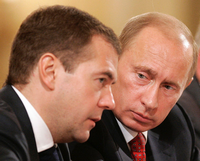
Russian President Dmitry Medvedev’s announcement last Saturday that he would not stand for re-election, instead nominating his predecessor and current prime minister, Vladimir Putin, to once again assume the office, came as a surprise to those of us who were expecting a continuation of the Medvedev-Putin tandem. At the same time, however, the somewhat trite and simplistic analysis being proferred by those who argue that Medvedev was nothing more than a seat-warmer for Putin until the latter could reclaim the presidency is not particularly helpful in understanding the direction Russian politics has taken — and will take. If Putin had […]
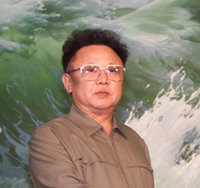
Like many policy issues regarding North Korea, the U.S. has no good options regarding the question of whether or not to resume deliveries of food aid to the isolated country. Last year’s flooding and severe weather have combined with Pyongyang’s perverse policies and rising world food prices to produce major shortfalls in food supplies in many parts of the Democratic People’s Republic of Korea (DPRK). The United States used to be one of North Korea’s major food donors until the deterioration in bilateral relations in 2008-2009 and the refusal by DPRK authorities to allow extensive monitoring of the aid flows […]
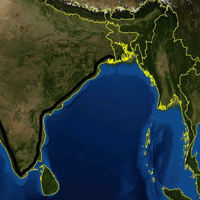
After almost 40 years of intermittent and fruitless talks, Bangladesh and Myanmar appear close to a final settlement of their maritime boundary dispute in the Bay of Bengal. Frustrated with stalled negotiations, Bangladesh submitted the case to the International Tribunal for the Law of the Sea (ITLOS) in 2009. After a series of oral hearings in September, which included numerous technical arguments, the court recently adjourned and plans to deliver a ruling in March 2012. The speed with which the case has progressed is in stark contrast to other maritime boundary disputes in Asia, but that is not surprising: There […]
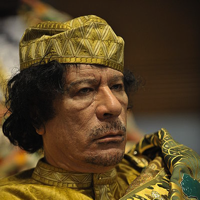
With the remaining loyalists of Moammar Gadhafi’s deposed regime facing their inevitable demise, it comes as no surprise that human rights organizations and international journalists are finding a multitude of mass graves and ample evidence that torture was a routine affair in Gadhafi’s Libya. But as Gadhafi’s bloody excesses return to the spotlight, so too does the corruption and cynicism exhibited by the regime’s fellow travelers from beyond Libya’s borders. It is well known that under Gadhafi, the country consistently maintained its place among the world’s “Worst of the Worst” violators of human rights and political freedoms. And yet, in […]
Iran recently joined Russia in expressing concern about negotiations among the European Union, Azerbaijan and Turkmenistan over a proposed trans-Caspian pipeline. In an email interview, Gawdat Bahgat, a political science professor at National Defense University, discussed diplomacy among the Caspian littoral states. WPR: What are the main issues facing the Caspian littoral states in terms of maritime boundaries and resource rights? Gawdat Bahgat: Though the Caspian region does not have the massive proven oil and gas reserves the Persian Gulf region holds, Azerbaijan, Kazakhstan and Turkmenistan have proven themselves as major energy producers and exporters. The intense disagreement over maritime […]

Many observers today view Pakistan much as they do neighboring Afghanistan: primarily in terms of terrorists and the Taliban. Yet, despite their lethality, these groups have so far remained largely limited to Pakistan’s periphery — an area of historical neglect with little consequence for the upper echelons of state power. In contrast, attention paid to the rest of Pakistan, where the vast majority of Pakistanis reside, has been sparser. This skewed focus makes it difficult to fully grasp the challenges driving insecurity in Pakistan. In fact, despite the dire depictions, no tribal insurgency can defeat Pakistan’s army and overthrow the […]

What future does the United States Army face? During eight years of operations in Iraq and 10 years in Afghanistan, the Army has shifted from being a force focused on high-intensity conventional operations to one more comfortable fighting a dispersed enemy intermingled with the population. However, operations are winding down in Iraq, and an endpoint seems to be nearing in Afghanistan. Armed with the collective experience developed in the War on Terror, how will the Army move forward to face new challenges and threats? The answers involve political and military considerations that may contradict each other. The fact that the […]
With Syria’s crackdown on democracy activists now in its seventh month, serious questions have begun to arise over the extent to which a militarized faction of the protest movement may, or may not, be able to mount an armed revolt against the government of President Bashar al-Assad. Reports this week honed in on a group of recently defected Syrian military soldiers and officers calling themselves the Free Syrian Army. While the group has created a presence online, according to Joshua Landis, the author of Syria Comment, a leading English-language blog on Syria, it now faces a true test in attempting […]

Though they have long existed, NGOs are playing an increasingly significant role in global governance, whether participating in the United Nations system or bringing global concerns to the domestic level. From local to global, NGOs are now an essential aspect of a variety of systems. It has become fashionable to assert that the role of nongovernmental organizations (NGOs) in world politics has grown in importance since the early 1990s. This assertion is true, but not because of the end of the Cold War nor because there is anything new about NGOs exercising influence, as is often claimed. Consider the success […]
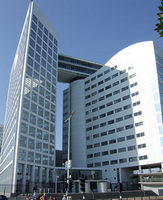
Nine years after its launch in July 2002, the International Criminal Court has made a promising though problematic start. Some of its difficulties are inherent in its mission and context. Others have been generated by states’ and officials’ behavior. Carrying out the court’s mandate to prosecute the perpetrators of humanity’s worst crimes would be difficult even in ideal circumstances. Circumstances are not ideal: The ICC is an international organization that many important states have not joined; it commands a limited budget; it is subject to the political and personal foibles common to international organizations; and finally, its independence is constrained […]
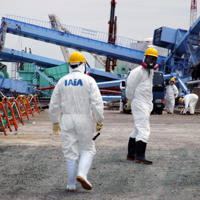
As the International Atomic Energy Agency held its Board of Governors meeting and annual General Conference over the past two weeks, the members of this often-overlooked United Nations body found themselves thrust again into the public limelight and burdened with a rapidly expanding agenda. Governments jousted over how to craft new approaches to deal with the aftermath of the nuclear accident at Fukushima, divvy up the agency’s budget and deal with controversial nuclear programs in the Middle East. The debates took place among a membership bitterly divided between those states with advanced nuclear capabilities and those that lack them, divisions […]
China announced earlier this month that it would give $1 billion in preferential loans to Caribbean countries to support economic development. In an email interview, R. Evan Ellis, an assistant professor at the Center for Hemispheric Defense Studies of the National Defense University, discussed China-Caribbean relations. WPR: What is the history of China’s relations with the Caribbean? R. Evan Ellis: China’s relationship with the Caribbean has historically been colored by politics, and in particular the politics of diplomatic recognition. Ideological affinity between mainland China and the new regime in Cuba led Havana to diplomatically recognize the People’s Republic of China […]
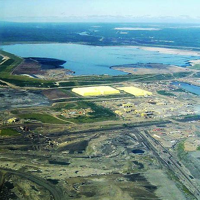
The proposed Keystone XL pipeline, which would bring crude oil from the so-called oil sands in Canada’s Alberta province through an almost 2,000-mile pipeline to the U.S. Gulf Coast, has in many ways become ground zero in the U.S. debate over fossil fuels, the environment and climate change. But perhaps most relevant in the current row, though practically absent from the debate, is the increasing awareness that energy security must be included as part of the calculus in determining energy sources. Indeed, terminology such as “friendly” supplier — regularly applied to Canada in U.S. energy discussions — underscores what is […]
